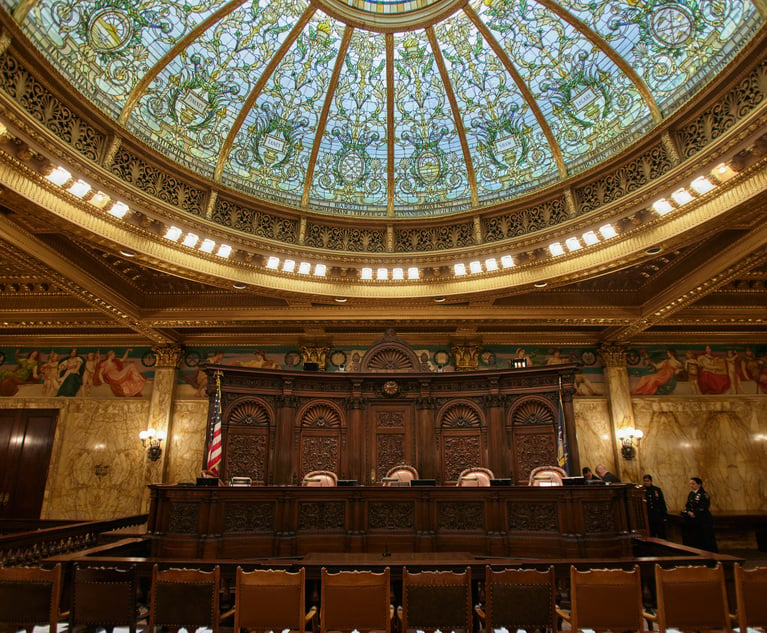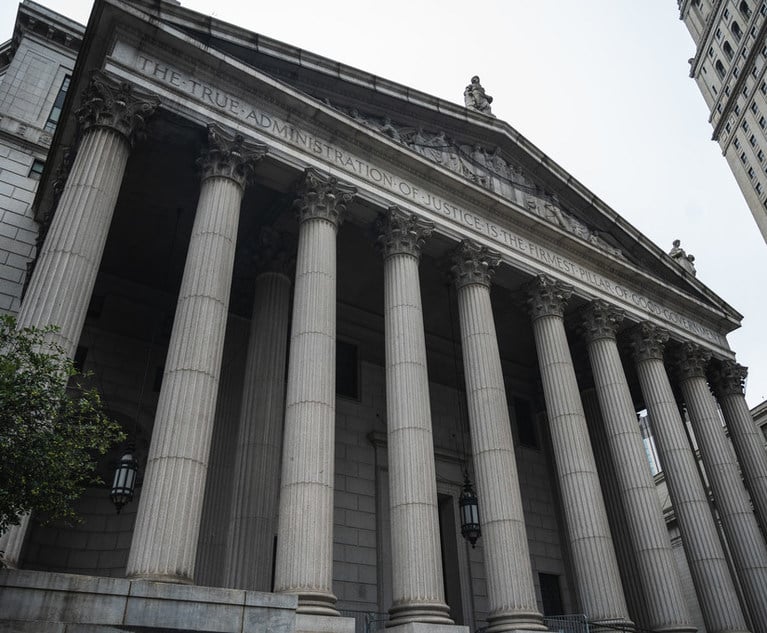Appellate Division Highlights from Second Quarter of 2020
From insurance to nuisance, E. Leo Milonas and Andrew C. Smith discuss several recent decisions from the New York courts, in their Appellate Division Review.
July 16, 2020 at 01:00 PM
9 minute read
 E. Leo Milonas and Andrew C. Smith
E. Leo Milonas and Andrew C. Smith
Gradually, New York's courts, like the rest of the state, are returning to a "new normal." When the justices of the Appellate Divisions have not been hearing arguments by videoconference, they have been hard at work writing opinions for cases brought in simpler times, and for some prompted by COVID, too. Below are some of the highlights from the second quarter of 2020.
First Department
NYC Human Rights Law (NYCHRL). The NYCHRL forbids landlords from discriminating against tenants because of "any lawful source of income." Does that include security deposit vouchers issued by the New York City Human Resources Administration (HRA), which guarantee payment of security deposits? In Estates NY Real Estate Servs. v. City of New York, 2020 N.Y. Slip Op. 03093 (1st Dep't May 28, 2020), the First Department held that it does.
A prospective tenant informed her landlord that she intended to pay her security deposit with an HRA voucher. The landlord insisted on a cash deposit. After the prospective tenant filed an administrative complaint, the landlord brought a declaratory judgment action in Supreme Court against the City, arguing that the HRA voucher was not a "source of income" because "income" denotes only a means of paying rent, not security deposits, and refers only to cash or cash equivalents, not vouchers, which are mere guarantees of payment. The Supreme Court disagreed and granted the City's motion to dismiss.
In an opinion by Justice Troy K. Webber, the First Department affirmed. The court noted that it previously held Section 8 vouchers (which are used to pay rent and security deposits) were "sources of income" but "never expressly addressed the issue of whether security deposit vouchers constitute lawful sources of income." Based on the text, legislative history and purpose of the NYCHRL, the court determined that the vouchers are indeed "sources of income" as "they are an item of value, worth a payment of up to one month's rent on the tenant's behalf to compensate for unpaid rent or damages to an apartment."
Insurance. A "creditor trust" is a litigation trust set up under Chapter 11 reorganization plans to pursue a bankruptcy estate's claims on behalf of unsecured creditors in the post-confirmation period. Is such a trust a "bankruptcy trustee" or "comparable authority" for purposes of D&O insurance policy provisions that restore coverage (otherwise excluded as an "insured vs. insured" claim) where the litigation is commenced by such entities? In Westchester Fire Insurance Co. v. Schorsch, 2020 N.Y. Slip Op. 02895 (1st Dep't May 14, 2020), the First Department held that a creditor trust is a "comparable authority."
Debtor RCAP had a D&O policy that excluded coverage for claims brought by or on behalf of RCAP against its current or former directors or officers. However, suits on behalf of RCAP by a "bankruptcy trustee" or "comparable authority" were excepted from the exclusion. After the creditor trust sued former directors and officers, the insurer sought a declaratory judgment that the insured vs. insured exclusion barred coverage. The Supreme Court ruled in favor of the insureds on the parties' dispositive motions.
In an opinion by Justice Dianne T. Renwick, the First Department affirmed, explaining that, under the plain language of the policy and the Bankruptcy Code, there was "no valid rationale for excluding D&O claims from D&O coverage when asserted by a post-confirmation litigation trust where coverage would otherwise exist for identical claims asserted by a Chapter 11 trustee." In both instances, the claims were being asserted on behalf of the estate for the benefit of creditors.
Disability Rights. In Center for Independence of the Disabled v. Metropolitan Transportation Authority, 2020 N.Y. Slip Op. 03203 (1st Dep't June 4, 2020), various disability rights organizations and individuals with disabilities sued the MTA and other agencies alleging unlawful discrimination against persons with disabilities in violation of NYCHRL because 80% of New York City subway stations are not equipped with vertical accessibility other than stairs. Defendants moved to dismiss the complaint as untimely because the inaccessible subway stations were built at the turn of the last century, and on the grounds that NYCHRL was preempted by the New York State Transportation Law, which imposes less strict accessibility requirements. The Supreme Court denied the motion.
The First Department unanimously affirmed. In an opinion by Justice Judith J. Gische, the court explained that the "continuous violation" doctrine—which is broader under NYCHRL than federal and state counterparts—tolls the statute of limitations until the discrimination ends. Here, the discrimination is not "limited to the single act of original construction"; it "continues every time a person seeks to use the subway system, but is prevented from doing so based upon their physical disability." As to preemption, the court held that NYCHRL does not conflict with the Transportation Law, as the latter "does not set a maximum number of accessible subway stations." Nor does the Transportation Law preempt the field: "the Transportation Law was never intended to be the final word on accessibility."
Second Department
Executive Authority.Does the New York governor have the authority to cancel a special election in response to a growing epidemic? In Dao Yin v. Cuomo, 183 A.D.3d 926 (2d Dep't May 27, 2020), the Second Department answered, "yes."
On April 24, 2020, Governor Andrew Cuomo issued an Executive Order in response to the spread of COVID-19, which canceled the special election for Queens Borough President. Petitioners, a registered voter and one of the candidates on the ballot, brought a special proceeding for a judgment declaring the Executive Order invalid as applied to the election. The Supreme Court denied the petition.
In a unanimous opinion by Justice Mark C. Dillon, the Second Department affirmed. Executive Law 29-a grants the governor the power to "temporarily suspend any statute, local law, ordinance, or orders, rules or regulations … during a state disaster emergency, if compliance with such provisions would prevent, hinder, or delay action necessary to cope with the disaster." The court held that this provision extends to cancelling the special election, and judgment in favor of the governor was warranted because he had demonstrated that the cancellation was the "minimum deviation necessary to assist or aid in coping with the COVID-19 pandemic."
Third Department
Freedom of Information Law (FOIL). The internet has been a boon for family history buffs. At the same time, the availability of personal information online poses risks of identity theft and harassment. In Hepps v. New York State Department of Health, 2020 N.Y. Slip Op. 02517 (3d Dep't April 30, 2020), the Third Department concluded that these competing concerns weighed against disclosure of marriage records under FOIL.
Petitioners, a non-profit genealogical advocacy organization and two of its officers, submitted a FOIL request for a copy of the state marriage index from 1881 through 2016, with the intent of making the records searchable and widely accessible on the internet. Respondent produced records through 1965 but withheld more recent records as exempt from disclosure on personal privacy grounds. Petitioners commenced an Article 78 proceeding, and the Supreme Court ordered the disclosure of the recent records (with certain information redacted).
In an opinion by Justice John P. Colangelo, the Third Department reversed. The court explained that an agency may decline disclosure if it "would constitute an unwarranted invasion of personal privacy," which is assessed by balancing privacy interests against the public interest in disclosure. Here, even assuming a legitimate public interest in genealogical research, that interest does not further the purpose of FOIL—to promote transparency and scrutiny of government actions. Moreover, significant privacy interests, including guarding against identify theft and protecting transgendered individuals, couples in same-sex marriages, and victims of sexual abuse, weighed in favor of exempting the records from disclosure. "The ubiquitous global Internet requires a different, more cautious analysis in addressing requests for the wholesale disclosure of personal information about private citizens on this scale."
Fourth Department
Nuisance.May an alleged victim of sexual abuse bring a claim based on a nuisance theory against a diocese for transferring an allegedly predatory priest among parishes? In Golden v. The Diocese of Buffalo, 2020 N.Y. Slip Op. 03354 (4th Dep't June 12, 2020), the Fourth Department answered in the negative.
Plaintiff alleged that he was abused at Our Lady of Perpetual Help by a priest who the diocese knew or should have known was a danger to children, and who the diocese moved from parish to parish without informing parishioners of the reported abuse. The Supreme Court granted the Diocese's motion to dismiss the sole cause of action for nuisance for failing to state a claim.
The Fourth Department affirmed. In an unsigned opinion, the court explained that public nuisance requires "substantial interference with the exercise of a common right of the public," but the complaint did not allege that the general public was exposed to the priest's conduct, only "parishioners … active in the priest's parishes." The court also rejected a claim based on criminal nuisance on the grounds that Penal Law §240.45 does not imply a private right of action.
E. Leo Milonas is a litigation partner at Pillsbury Winthrop Shaw Pittman. He is a former Associate Justice of the Appellate Division, First Department, and the former Chief Administrative Judge of the State of New York. Andrew C. Smith is also a litigation partner at the firm. Pillsbury counselJay D. Dealy and Joshua I. Schlenger and associate Brian L. Beckerman assisted in the preparation of this column.
This content has been archived. It is available through our partners, LexisNexis® and Bloomberg Law.
To view this content, please continue to their sites.
Not a Lexis Subscriber?
Subscribe Now
Not a Bloomberg Law Subscriber?
Subscribe Now
NOT FOR REPRINT
© 2025 ALM Global, LLC, All Rights Reserved. Request academic re-use from www.copyright.com. All other uses, submit a request to [email protected]. For more information visit Asset & Logo Licensing.
You Might Like
View All
Decision of the Day: Trial Court's Sidestep of 'Batson' Deprived Defendant of Challenge to Jury Discrimination

Decision of the Day: Commercial Division Finds Defendant Engaged in Unfair Competition Against Plaintiff

Decision of the Day: Court Rules on Judgment Motions Over Police Killing of Pet Dog While Executing Warrant

Decision of the Day: JFK to Paris Stowaway's Bail Revocation Explained
Trending Stories
- 1Gunderson Dettmer Opens Atlanta Office With 3 Partners From Morris Manning
- 2Decision of the Day: Court Holds Accident with Post Driver Was 'Bizarre Occurrence,' Dismisses Action Brought Under Labor Law §240
- 3Judge Recommends Disbarment for Attorney Who Plotted to Hack Judge's Email, Phone
- 4Two Wilkinson Stekloff Associates Among Victims of DC Plane Crash
- 5Two More Victims Alleged in New Sean Combs Sex Trafficking Indictment
Who Got The Work
J. Brugh Lower of Gibbons has entered an appearance for industrial equipment supplier Devco Corporation in a pending trademark infringement lawsuit. The suit, accusing the defendant of selling knock-off Graco products, was filed Dec. 18 in New Jersey District Court by Rivkin Radler on behalf of Graco Inc. and Graco Minnesota. The case, assigned to U.S. District Judge Zahid N. Quraishi, is 3:24-cv-11294, Graco Inc. et al v. Devco Corporation.
Who Got The Work
Rebecca Maller-Stein and Kent A. Yalowitz of Arnold & Porter Kaye Scholer have entered their appearances for Hanaco Venture Capital and its executives, Lior Prosor and David Frankel, in a pending securities lawsuit. The action, filed on Dec. 24 in New York Southern District Court by Zell, Aron & Co. on behalf of Goldeneye Advisors, accuses the defendants of negligently and fraudulently managing the plaintiff's $1 million investment. The case, assigned to U.S. District Judge Vernon S. Broderick, is 1:24-cv-09918, Goldeneye Advisors, LLC v. Hanaco Venture Capital, Ltd. et al.
Who Got The Work
Attorneys from A&O Shearman has stepped in as defense counsel for Toronto-Dominion Bank and other defendants in a pending securities class action. The suit, filed Dec. 11 in New York Southern District Court by Bleichmar Fonti & Auld, accuses the defendants of concealing the bank's 'pervasive' deficiencies in regards to its compliance with the Bank Secrecy Act and the quality of its anti-money laundering controls. The case, assigned to U.S. District Judge Arun Subramanian, is 1:24-cv-09445, Gonzalez v. The Toronto-Dominion Bank et al.
Who Got The Work
Crown Castle International, a Pennsylvania company providing shared communications infrastructure, has turned to Luke D. Wolf of Gordon Rees Scully Mansukhani to fend off a pending breach-of-contract lawsuit. The court action, filed Nov. 25 in Michigan Eastern District Court by Hooper Hathaway PC on behalf of The Town Residences LLC, accuses Crown Castle of failing to transfer approximately $30,000 in utility payments from T-Mobile in breach of a roof-top lease and assignment agreement. The case, assigned to U.S. District Judge Susan K. Declercq, is 2:24-cv-13131, The Town Residences LLC v. T-Mobile US, Inc. et al.
Who Got The Work
Wilfred P. Coronato and Daniel M. Schwartz of McCarter & English have stepped in as defense counsel to Electrolux Home Products Inc. in a pending product liability lawsuit. The court action, filed Nov. 26 in New York Eastern District Court by Poulos Lopiccolo PC and Nagel Rice LLP on behalf of David Stern, alleges that the defendant's refrigerators’ drawers and shelving repeatedly break and fall apart within months after purchase. The case, assigned to U.S. District Judge Joan M. Azrack, is 2:24-cv-08204, Stern v. Electrolux Home Products, Inc.
Featured Firms
Law Offices of Gary Martin Hays & Associates, P.C.
(470) 294-1674
Law Offices of Mark E. Salomone
(857) 444-6468
Smith & Hassler
(713) 739-1250






